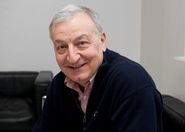Meeting
2013 ASCO Annual Meeting

The Royal Marsden NHS Foundation Trust, London, United Kingdom
Martin Eric Gore , Viktor Gruenwald , Robert John Motzer , David I. Quinn , Brian I. Rini , Xun Lin , Julia Jane Perkins , Ronit Simantov , Toni K. Choueiri
Background: Fatigue is a common toxicity in pts with mRCC, often associated with therapy, particularly with tyrosine kinase inhibitors (TKI). We performed a pooled retrospective analysis of pts with mRCC treated in clinical studies in order to explore predictors for fatigue. Methods: Data from pts treated in Pfizer mRCC trials (2003-2011) from phase III (NCT00083899, NCT00065468, NCT00678392) and phase II trials (NCT00054886, NCT00077974, NCT00083889, NCT00338884, NCT00137423) were included. Adverse event (CTCAE v3.0) terms of “fatigue” and “asthenia” were used. Hypothyroidism was defined as TSH>ULN or T4<LLN. A multivariate logistic regression analysis was performed to identify significant risk factors for grade (G) 2 (moderate or causing difficulty performing some ADL) or higher fatigue. Results: 2749 pts (71% male) with a median age 60 (33% ≥65) were treated (median 162 days) with axitinib (n=359), sunitinib (n=1059), temsirolimus (TEM) (n=208), interferon-alfa (IFN) (n=560), sorafenib (n=335), or TEM + IFN (n=208). Most pts had baseline ECOG PS of 0 (47%) or 1 (51%), clear cell histology (91%), and nephrectomy (84%). 553 (20%) pts reported fatigue prior to starting study therapy. During study, fatigue was reported in 1794 (65%) pts (21% G1, 26% G2, 17% G3, 1% G4); in 61% pts worst grade was reported within the first 2 months of therapy. Fatigue led to discontinuation in 2%, and dose interruption or adjustment in 8%. Of 1773 pts treated with TKIs, 42% had ≥G2 fatigue. Of pts treated with TEM, IFN or both, 39%, 50% and 50%, respectively, had ≥G2 fatigue. Baseline factors [Odds Ratio] associated (p < 0.05) with ≥G2 fatigue were pretreatment fatigue [1.7] or hypothyroidism [1.6], age ≥65 [1.6], time from diagnosis ≥1 yr [1.4], female gender [1.3], ECOG PS 0 [0.7], and Asian vs Caucasian race [0.5]. Baseline LDH, calcium, and anemia were not significant. Conclusions: Pt attributes and comorbidities at baseline, independent of therapy, are associated with increased risk of clinically significant fatigue in pts treated for mRCC, and can be used to generate a predictive model. Appropriate counseling and control of co-morbid conditions may be important in managing fatigue in pts on TKI therapy.
Disclaimer
This material on this page is ©2024 American Society of Clinical Oncology, all rights reserved. Licensing available upon request. For more information, please contact licensing@asco.org
2013 ASCO Annual Meeting
Publication Only
Publication Only
Genitourinary Cancer
Kidney Cancer
J Clin Oncol 31, 2013 (suppl; abstr e15624)
10.1200/jco.2013.31.15_suppl.e15624
e15624
Abstract Disclosures
2022 ASCO Genitourinary Cancers Symposium
First Author: Martin H Voss
2013 ASCO Annual Meeting
First Author: Rana R. McKay
2016 Genitourinary Cancers Symposium
First Author: Sandhya Srinivas
2018 Genitourinary Cancers Symposium
First Author: Sergio Bracarda